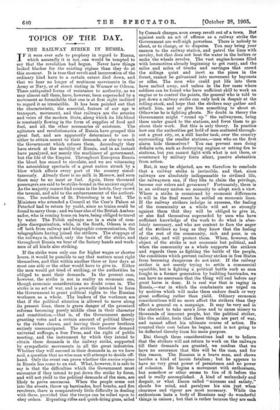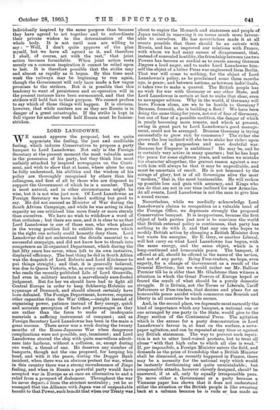THE RAILWAY STRIKE IN RUSSIA.
TOPICS OF THE DAY.
IF it were ever safe to prophesy in regard to Russia, which assuredly it is not, one would be tempted to say that the revolution had begun. Never have things looked blacker for the existing regime than they do at this moment. It is true that revolt and insurreotion of the ordinary kind have to a certain extent died down, and that we hear no longer of mutinous movements in the Army or Navy, or of street rioting in Warsaw or Odessa. These antiquated forms of resistance to authority, as we may almost call them, have, however, been superseded by a movement so formidable that one is at first sight inclined to regard it as irresistible. It has been pointed out that the characteristic, the essential, feature of our age is transport, movement, and that railways are the arteries and veins of the modern State, along which its life-blood is constantly flowing in the form of supplies of food and fuel, and all. the other necessaries of existence. The agitators and revolutionaries of Russia have grasped this great fact, and are apparently determined to use it either to obtain assent to their demands, or else to wreck the Government which refuses them. Accordingly they have struck at the mobility of Russia, and in an instant have paralysed, not merely the machinery of government, but the life of the Empire. Throughout European Russia the blood has ceased to circulate, and we are witnessing the astonishing spectacle of a great nation struck by a blow which affects every part of the country simul- taneously. Already there is no milk in Moscow, and soon there may be no meat or fuel. Again, three thousand passengers are said to be strike-bound in the ancient capital. As the majority cannot find rooms in the hotels, they crowd the termini, and add to the embarrassment of the authori- ties. The condition of St. Petersburg is as bad. The Ministers who attended a Council at the Czar's Palace at Peterhof had to return by yacht, since no trains could be found to carry them ; and we hear also of the British Ambas- sador, who is coming home on leave, being obliged to travel by water. The Polish railways are in a state of com- plete disorganisation, while, in the South, Odessa is cut off both from railway and telegraphic communication, the telegraphists having joined the strikers. The stoppage of the railways is, indeed, only the basis of the strike, and throughout Russia we hear of the factory hands and work- men of all kinds also striking.
If the strike were only one for higher wages or shorter hours, it would be possible to say that matters must right themselves, and that within another three or four days at most one side or the other would have to give in. Either the men would get tired of striking, or the authorities be obliged to meet their demands. In the present case, however, the strike is not in reality an economic one, though economic considerations no doubt come in. The strike is an act of war, and is avowedly intended to force the Government to grant political rights to the Russian workmen as a whole. The leaders of the workmen see that if the political situation is allowed to move along its present lines, there is grave danger of the promised reforms becoming purely middle class in their character and constitution,—that is, of the Government merely granting votes and a certain amount of political liberty to the richer classes, and leaving their poorer brethren entirely unemancipated. The strikers therefore demand universal suffrage, a free Press, and the right of public meeting, and the instrument by which they intend to obtain these demands is the railway strike, supported by sympathetic movements in all the great industries. Whether they will succeed in their demands is, as we have said, a question that no wise man will attempt to decide off- hand. Only the event can prove whether the ancien regime in Russia has come to an end. What, however, it is safe to say is that the difficulties which the Government must encounter if they intend to put down the strike by force, and will not yield to the political demands of the men, are likely to prove enormous. When the people come out into the streets, throw up barricades, hurl bombs, and fire revolvers, there is comparatively little difficulty in dealing with them, provided that the troops can 'be relied upon to obey orders. Repeating-rifles and quick-firing guns, aided by Cossack charges, soon sweep revolt out of a town. But against such an act of offence as a railway strike the Government are well-nigh powerless. There is nobody to shoot, or to charge, or to disperse. You may bring your cannon to the railway station, and patrol the lines with cavalry, but that does not heat the water in the boilers or make the wheels revolve. The vast engine-houses filled with locomotives already beginning to get rusty, and the miles and miles of trucks and carriages that crowd the sidings quiet and inert as the pines in the forest, cannot be galvanised into movement by bayonets or rifles. The men who could put life into them have melted away, and unless in the few cases where soldiers can be found who have sufficient skill to work an engine or to control the points, the general who is told to • put down a railway strike can only look in despair at the rolling-stock, and hope that the strikers may gather and attack him, and so give him something to shoot at. Otherwise he is fighting ghosts. No doubt in theory the • Government might " round up " the railwaymen, bring them under guard to the stations, and force them to go about their work. But this is only theory. In practice how can the authorities get hold of men scattered through- out a great city, or, a still harder task, over the country surrounding the smaller stations,—men who on the first alarm hide themselves ? You can prevent men doing definite acts, such as destroying engines or setting fire to stations, but you cannot fight with what is not there, or counteract by military force silent, passive abstention from action.
But, it may be objected, are we therefore to conclude that a railway strike is invincible, and that, since railways are absolutely indispensable to civilised life, the railway-men can, if they like to claim the privilege, become our rulers and governors ? Fortunately, there is in an ordinary nation no necessity to adopt such a view. Where a strike is occasioned by economic differences it will in the final resort be settled on economic lines. If the railway strikers indulge in excesses, the feeling of the community as a whole will set so strongly against them that they will be obliged to give in, or else find themselves superseded by men who have sufficient knowledge of the work to do what is abso- lutely necessary, and who are content to face the anger of the strikers as long as they know that the feeling of the rest of the community, rich and poor, is on their side, and will protect them. When, however, the object of the strike is not economic but political, and when the community as a whole supports the strikers and regards them as fighting the battle of the people, the conditions which prevent railway strikes in free States from becoming dangerous do not exist. If the railway striker is not merely trying to settle a commercial squabble, but is fighting a political battle such as men fought in a former generation by building barricades, we can have no assurance that the thing will end before any , great harm is done. It is real war that is raging in Russia,—war in which the combatants are urged on by motives which will make them endure death or very great suffering rather than yield. Odinary economic considerations will no more affect the strikers than they affect a general on a campaign. It may be very sad in' the abstract to take men's lives and to cause misery to thousands of innocent people, but the political striker,. like the soldier, feels that these things are part of war, and cannot affect his ultimate course of action. He counted their cost before he began, and is not going to be deflected thereby from his main purpose.
But though these considerations lead us to believe that the strikers will not return to work on the railways till their demands are granted, we confess that we have no assurance that this will be the case, and for this reason. The Russian is a brave man, and shows besides a kind of heroic fatalism ; but he appears to have no very great power of persistence and no power of cohesion. He begins a movement with enthusiasm, but somehow or other seems to tire of it before the end is really accomplished. A kind of melancholy and despair, or what Bacon called "niceness and satiety," clouds his mind, and paralyses his aim just when' clearness and vigour are most necessary. While the enthusiasm lasts a body of Russians may do wonderful things in unison ; but that is rather because they are each individually inspired by the same purpose than because they have agreed to act together and to subordinate their private wishes to the determination of the whole body. It is not until men are willing to say " Well, I don't quite approve of the plan myself, but we have all agreed to it, and therefore I shall, of course, act with the rest," that joint action becomes formidable. When joint action rests merely on a common inspiration it cannot be relied upon to last. It is therefore possible that the strike may end almost as rapidly as it began. By this time next week the railways may be beginning to run again, though the Government will only have made a few vague promises to the strikers. But it is possible that this tendency to want of persistence and co-operation will in the present instance have been surmounted, and that the strikers will hold fast to their purpose. We cannot profess to say which of these things will happen. It is obvious, however, that while matters are as they are Russia is in danger of a great catastrophe. If the strike is kept in full vigour for another week half Russia must be famine- stricken.



















































 Previous page
Previous page